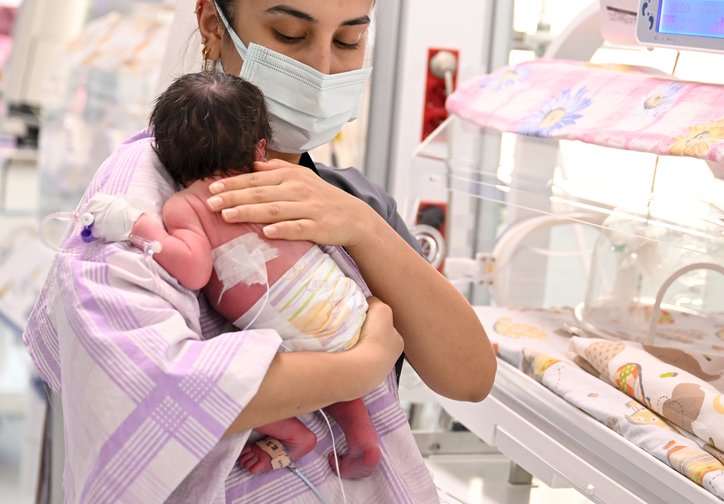Gülçin is in the East Anatolian ancient city of Malatya, once renowned for its apricots but now devastated by the quakes. All of Gülçin’s medication is under debris. Without enough food or nutrition, she worries that she and the baby she’s carrying won’t survive. While she knows that the intense stress she’s experiencing will affect the child negatively — the more she thinks about it, the more stressed she gets.
“I used to be afraid of giving birth,” Gülçin said. “But now, I am afraid that I won't be able to give birth.”
There’s a high demand for folic acid, food, diapers, blood work, and vaccines for their newborn babies by mothers and pregnant women in the affected areas, Leyla Kalin, a nurse at SES, told openDemocracy. She added that most women don’t have vaccine records, many of which were lost in the earthquakes.
Sürmeli has been working to resolve this issue through his non-profit HERA’s mobile health app that helps women keep vaccination records together in one place on their phones.
The app opened up to displaced women in Turkish quake zones for the first time last month after having exclusively served mostly Syrian refugees in Türkiye since its launch in 2018.
After disasters, women are exposed to long-term impacts, including vaccine-preventable diseases, pregnancy-related deaths, newborn deaths, and gender-based violence that require “constant support” and “check-ins”, said Sürmeli. He believes in providing basic digital infrastructure to help women get connected with local health services as one of the main solutions.
Currently, HERA is working to develop a helpline coupled with an AI chatbot to assist women in quake zones navigating sexual reproductive health services by sharing their location via WhatsApp.
HERA, MEDAK, and the Turkish non-profit Development Workshop also created a live online disaster map last month alerting women of the nearest health centre locations, updated every 10 minutes by field workers and volunteers on the ground in Türkiye. Since launching last month, the portal has been used over 4,000 times, according to Sürmeli.
Psychological impact on women, children, and health workers
Sürmeli has been personally impacted by the earthquakes, too. He hails from Hatay, approximately the size of Norfolk in England. “I went to my hometown and it’s completely gone,” he said.
He admits that he’s learned to put personal grieving aside.
“It's not always the healthiest thing to do,” Sürmeli said. “But you have to find a way to survive in the field to keep working.”
HERA, MEDAK, and the Developmental Workshop are offering health workers psychological screenings to determine whether they’re fit to work. There are also rotations in the field and opportunities to take time off.
The Turkish health union SES said it has repeatedly called for the Turkish Ministry of Health to work together with health labour and professional organisations “to meet the needs for health services in the region” to no avail.
“[Health workers and victims] never had the time to mourn because the [state never created] an area where they could heal,” said Kalin who has been working in a women’s health unit built by SES and the Turkish Medical Association (TTB) in Hatay.
In the southernmost Turkish city reduced to ruins and tents, Esra is trying to rebuild her life. At the same time, she’s not only trying to protect her own mental health but that of her four children. Amidst all of the rubble, missing people, death, and injured relatives — it’s not easy.
“The children wake up every night startled by the sound of a car — ‘is it a new earthquake?’,” Esra said. “My son cries to me, 'Mum, please don't walk away anywhere, don't let anything happen to you, I can't be without my mum.’”
Esra and her children are now living inside the family car, whilst her husband is abroad, relying on limited supplies of petrol for heating. Other families are living in tents or in partially ruined buildings. The mum of four counts every droplet of clean water given to them by humanitarian aid workers. She rations food for her children. She reuses and hand-washes her children’s diapers with any water she can find, despite the risk of diaper rash.
“It is very difficult to change diapers in this cold,” she said. “We leave our discomfort aside and try to protect our children.”
HERA, MEDAK, and the Developmental Workshop have signed a lease agreement for at least another five years.
“The effects of the earthquake are going to take at least 10 years,” Sürmeli said. “We need to stay here and keep working for women and children because they’re the most vulnerable.”
A version of this article originally appeared in Turkish written by Birgül Çay for Birgün Newspaper on 15 February 2023.


Comments
We encourage anyone to comment, please consult the oD commenting guidelines if you have any questions.